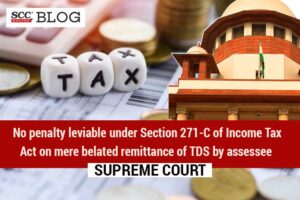Supreme Court: In a set of civil appeals, against the order of Kerala High Court confirming the levy of interest/penalty under Section 271-C of the Income Tax Act, 1961 (‘IT Act’) on assessee’s failure to deposit the tax deducted at source (TDS) or belated remittance of the TDS, the Division Bench of M.R Shah* and C.T Ravikumar quashed the High Court’s order and held that on mere belated remittance of the TDS after deduction by the assessee , no penalty shall be levied under Section 271-C of IT Act.
Factual Background
In the matter at hand, from 01.04.2002 to February 2003, the assessee engaged in a software development business deducted TDS in respect of salaries, contract payments, etc., totaling Rs. 1,10,41,898/- for the assessment year (‘AY’) 2003-04. In March, the assessee remitted part of the TDS being Rs. 38,94,687 and balance of Rs. 71,47,211 were remitted later. Thus, the period of delay ranged from 05 days to 10 months. On 10.03.2003, a survey was conducted by the Revenue at assessee premises, and it was noted that TDS was not deposited within the prescribed dates under Income Tax Rules (‘IT Rules’). The Additional Commissioner of Income Tax (ACIT) vide order under Section 271-C of IT Act levied a penalty of Rs. 1,10,41,898 equivalent to the amount of TDS deducted for AY 2003-04 due to the delay in remittance of TDS. That order of ACIT levying the penalty under Section 271-C came to be confirmed by the High Court by the impugned judgment and order.
Supreme Court’s Analysis
Whether belated remittance of the TDS subjects the appellant to pay penalty under Section 271-C of IT Act?
The Court noted that wherever the Parliament wanted to have the consequences of non-payment or belated remittance of the TDS, it has provided the same in Section 201(1A) and Section 276-B of IT Act. The Court interpreted Section 271-C of IT Act and held that there shall be no penalty leviable under Section 271-C on belated remittance of the TDS after the same is deducted by the assessee.
Further placing its reliance on Central Board of Direct Taxation’s (‘CBDT’) circular No. 551 dated 23-01-1998, the Court said that the circular clearly mentions that if there is any delay in remitting the tax, it will attract payment of interest under Section 201(1A) of IT Act. Therefore, no penalty is envisaged under Section 271-C of IT Act for belated remittance of the TDS on the assessee.
What is the meaning and scope of the words “fails to deduct” in Section 271-C(1)(a) of IT Act?
The Court noted that the words used in Section 271-C(1)(a) are very clear and relevant, the words used are “fails to deduct”, it does not speak about belated remittance of the TDS, it plainly says that if any person fails to deduct the whole or any part of the tax as required by or under the provisions of Chapter XVII-B then such person shall be liable to pay by way of penalty a sum equal to the amount of tax which such person failed to deduct or pay. The words “fails to deduct” occurring in Section 271-C(1)(a) cannot be read into “failure to deposit/pay the tax deducted”. Further, the Court said that Section 271-C of IT Act is quite categoric and its scope and extent of application is evident from the provision itself, in unambiguous terms.
The Court said that as per the settled position of law, the penal provisions are required to be construed strictly and literally. As per the cardinal principle of interpretation of statute and particularly the penal provisions are required to be read as they are, nothing is to be added or nothing is to be taken out of the penal provision.
Thus, the assessee’s appeals were allowed, and the impugned orders of the High Court were quashed and set aside.
[US Technologies International Pvt. Ltd. v. The Commissioner of Income Tax, 2023 SCC OnLine SC 387, decided on 10-04-2023]
*Judgment Authored by: Justice M.R. Shah

